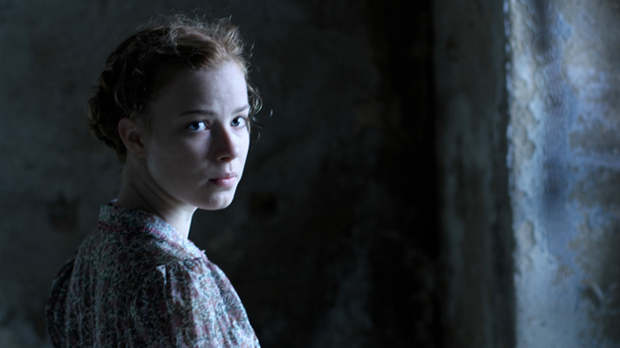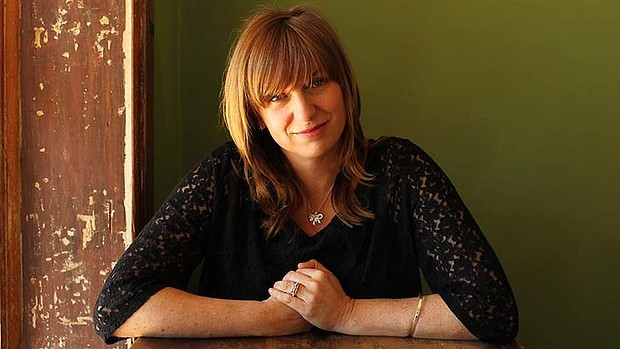 Back to selection
Back to selection
Director Cate Shortland on Lore

In telling the story of Lore (Saskia Rosendahl), a 14-year-old daughter of Nazi parents who travels across a devastated Germany in 1945, Cate Shortland’s Lore, adapted from Rachel Seiffert’s novel The Dark Room, plays with fire. As the director acknowledges, it could easily be misread as a statement that (Gentile) Germans were also victims of World War II. Instead, the film suggests what it’s like to fall from great privilege. Without fully understanding what it means to be a Nazi and what responsibility for evil her parents hold, Lore goes from being rich and well cared for to being treated like scum. Although Shortland is Australian, Lore could pass for a product of ‘70s New German Cinema. Her style relies heavily on tight close-ups and shallow focus, as Lore and her traveling companions pass through the German wasteland and try to make sense of the changes in their lives. In advance of the film’s February 8 release through Music Box Films, Filmmaker sat down with Shortland to discuss Lore.
Filmmaker: Are you of German descent? If not, do you have any direct connection to Germany and World War II?
Shortland: I’m not German. My husband’s family is German-Jewish. They left Germany in 1937. But I’ve been going to Germany on and off for years. I love the culture and I find it a incredibly vibrant place. My husband and I have been living in Berlin for a couple years.
Filmmaker: Did your husband introduce you to the novel?
Shortland: No, I was introduced to the novel at the Edinburgh Film Festival by the producer Paul Welsh.
Filmmaker: Were you conscious of fitting into a tradition of road movies, some of them German?
Shortland: Not so much. I was inspired by a Russian film, Elem Klimov’s Come and See. I was also inspired by German fairy tales and the kind of erotic violence and wondrous characters and worlds they create.
Filmmaker: How aware were the children and teens in your cast about German history?
Shortland: They were really aware, especially the teens. It’s such a huge part of their education. The little kids knew there had been a war and Jews had been persecuted. I don’t know if they knew about the horrendous nature of that, because they’re so young. We gave the script to their parents and asked if there was anything they’d like us to take out. They told us to leave everything in, because the kids were old enough to understand. We had a very open, easy way of speaking about these issues. Everyone wanted to make the most truthful film.
Filmmaker: Was it hard to find an actress for the lead?
Shortland: Yes. We looked at over 300 girls. Saskia was really made to play that role. She’s nominated for a Shooting Star award in Europe. We’ll find out in a couple of weeks if she wins that. She’s very full of joy. It’s kind of a contradiction because she plays this serious, austere character with no empathy. You watch her flower as the film goes on.

Filmmaker: Blue is the dominant color of the costumes and cinematography. How did you settle on that tone?
Shortland: We looked at old footage of Eva Braun and home movies which were in color . The colors of women’s clothes were blue and pink pastels. They were quite vibrant, actually. That really influenced us. It was also shot largely at dusk and dawn, and blue seeps into everything at that time of day.
Filmmaker: Have you heard from anyone who’s found the film’s take on German history problematic?
Shortland: Not really. What people are interested in is what the film says abut humanity and the misuse of power, as well as the impact of fascism on children. It was the gala film at the London Jewish Film Festival. It’s been sold to Israel. It’s playing across the world and has won a lot of audience awards. I haven’t seen another film about a child whose father is a mass murderer. So I think the perspective is one that people find interesting.
Filmmaker: Traveling with it, do you think that people are responding to the universal theme of institutionalized violence?
Shortland: I do, and also about fundamentalism. It’s such huge topic now, with young people strapping bombs to themselves and blowing themselves up in the name of a political or religious belief. Lore has that kind of fervent belief. I think the film is historical, but it also speaks to many contemporary issues about young people driven by fervent utopian dreams about what the world should be.
Filmmaker: How were you able to put together a German-Australian-British co-production?
Shortland: I didn’t have to do it, thank God. I had a really experienced producer in Liz Watts, who’s Australian, as well as Paul Welsh. Then we had partners in Germany. It was really hard work because the financial crash happened just before we were about to shoot. The UK Film Council folded, and then we had to spend another year looking for money. It was not an easy time for the producers.
Filmmaker: Do you plan to make more films in Europe?
Shortland: This experience has been incredible. I was really frightened to make this film, but it’s been one of the biggest changes in my life. I’ve learned a lot about myself by doing it.
Filmmaker: What did you find frightening about it?
Shortland: The perspective. I was always worried that people would think we were making an apologist film. I was afraid people wouldn’t realize we were making a film about the children of perpetrators, that we were saying Germans were also victims of the war. That’s not the heart of the film. For me, it’s finding out what it means when your parents have lied to you and your government is completely corrupt. How do you become a good person, and how do you find empathy again? We had to be pretty vigilant about every line of dialogue.
Filmmaker: Were you conscious of trying to hide your “Australianess” and working like a native German?
Shortland: I was really conscious of language and intonation. I watched films like Lilya 4-Ever and Babel and watched those filmmakers being interviewed about working in other languages. My fundamental terror was that German people would watch it and laugh. Thank God that hasn’t been the case. German people often address me in German and are astounded that I can’t speak their language. It’s created an interesting dialogue about 1945. We also won an award about the Hamburg Film Festival.
Filmmaker: Do you have any new projects in the works?
Shortland: I’m making a new film with Jan Chapman in Indonesia. I’m really excited about that. I’m working on television as a writer too.
